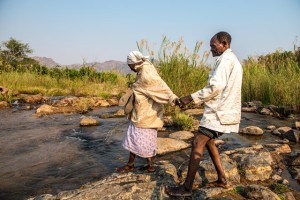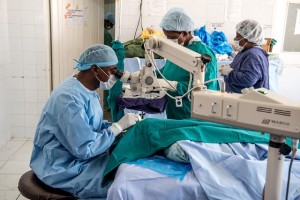This week 69-year-old Winesi March, who has been blind for two years, will undergo life-changing surgery as the world watches.
Twenty-four hours later anyone with an internet connection can rejoin Winesi and his family in rural Malawi as his bandages are removed and he sees his grandson for the first time.
There [...]]]>
This week 69-year-old Winesi March, who has been blind for two years, will undergo life-changing surgery as the world watches.
Twenty-four hours later anyone with an internet connection can rejoin Winesi and his family in rural Malawi as his bandages are removed and he sees his grandson for the first time.
There are so many neglected causes, too many forgotten needs, a world wide web full of campaigns and emergencies demanding our attention. Some broadcasters claim audiences are dropping because of what can feel like an overwhelming number of tough realities out there.
This week Sightsavers is broadcasting the story of one man having eye surgery live online to highlight that many global “issues” are straightforward and cost effective to solve. It will bring the little-known reality of what it means to live with cataract in rural Africa to front rooms, computer screens and mobile phones around the world. It will show how lives can be changed in just two days.
As head of an organisation that saves sight and prevents blindness, as well as supporting those who are irreversibly blind, my priority is to do whatever we can to ensure people in the countries where we work can get access to good eye health services. It is their right, after all. Visual impairment usually means people find working, looking after their families and even just travelling from A to B a challenge.
Although cataract surgery is a straightforward procedure we are still seeing stubbornly high levels of the problem in developing countries. Our new appeal – A Million Miracles – aims to raise enough money to support one million sight-restoring surgeries in the next three years.
The appeal is kick started with support from the UK government – they will match donations made before the end of the year as part of their UK Aid Match programme.
Treatment for cataract in the UK is widely available, yet it still affects 20 million people globally, with the majority of living in the developing world.
As campaigners we hope everyone who watches the broadcast will be as outraged as we are that not everyone has easy access to treatment, and are forced to spend years blind, when it could have been prevented. We hope everyone will share in the beautiful moment of restored sight, and joy as a family is brought together.
Winesi’s wife Namaleta has increasingly been forced to shoulder the responsibilities of strenuous farming work, running the household and taking care of the children.
When we asked Winesi how he’ll feel if his sight is restored, he said, “I’ll take up my hoe and jump up and down. When I have sight, I will run into town and buy my wife a new dress and shoes so she will look beautiful.”
His sense of excitement is infectious, and it’s amazing to think that an operation on 8 October, which may take as little as fifteen minutes, could change his life so significantly.
Our digital event is being presented by You Tube vlogger Doug Armstrong live through a Google+ hangout on Wednesday 8 and Thursday 9 October at 1.30pm UK time (8:30am EST) at www.millionmiracles.org.
Ophthalmologist Dr Gerald Msukwa will talk through the procedure and take questions from the online audience.
But Sightsavers’ work goes beyond the miracle of one man’s sight being restored. If we are to ensure that cataract operations are as readily available in Malawi, and other countries, as they are in the UK, we have to help Ministries of Health in these countries to develop health services to provide treatment for cataract, glaucoma and other eye conditions.
We need to support the training of doctors and nurses as well as providing equipment and medicines. In recent years we have worked increasingly closely with governments to ensure they have the right environment and career structures for people, and that eye care is included in national health plans.
I have visited many of the countries where we work. I’ve met people who have to travel miles to the nearest health clinic, with old broken equipment and visited hospitals with one overstretched ophthalmologist who is working around the clock close to exhaustion.
This online first will, we hope, give others a chance to visit a remote hospital in Malawi, without even leaving their desk. They will see first-hand what a profound impact they can have on someone’s life in just two days – even if they are thousands of miles away.
Sightsavers works with partners in the developing world to combat avoidable blindness. Dr Caroline Harper OBE joined Sightsavers in 2005 as Chief Executive, having made the decision to move from the corporate world into the not-for-profit sector inspired by her travels in developing countries. She also had a number of blind family members so Sightsavers mission has personal resonance for her.
]]>I decided to visit my Nicaraguan friend who stays in a village called Fougamou, in central Gabon. So I looked up the nearest town, Lambaréné. It turned out to have a museum honouring Dr. Albert Schweitzer, who arrived there in 1913, built a hospital, and won a Nobel Peace Prize in 1952.
I [...]]]>
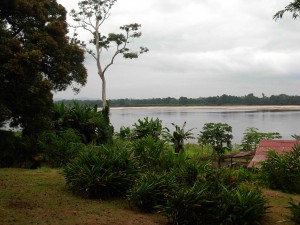
The Ogooué River seen from Dr. Schweitzer's home. Photo: M. Sayagues
I decided to visit my Nicaraguan friend who stays in a village called Fougamou, in central Gabon. So I looked up the nearest town, Lambaréné. It turned out to have a museum honouring Dr. Albert Schweitzer, who arrived there in 1913, built a hospital, and won a Nobel Peace Prize in 1952.
I had never been interested in him but it seemed like a truly off-the-beaten path museum, just my kind. But what sold me on Lambaréné was the name of its river: Ogooué. I HAD to see a river with such a wondrous name.
So I set off to Lambaréné on my way to Fougamou. Believe me, I was in the green heart of Africa. Green, as in rainforest.
I am glad I went. The river is awesome. The museum is charming. It preserves the old hospital and personal quarters from the 1920s as they were originally. Next is the modern hospital, which attends to 80,000 consultations and 6,000 hospitalized patients every year, and continues to practice what I believe was Schweitzer’s most creative medical idea: to welcome the African family, with place to wash, cook and sleep, in a hospital-cum-village.
True, the relatives provided – and still do – free labour. Also true, it is mostly women and girls who provide this free labour. In Gabon and elsewhere, caring for the sick and, increasingly, for the elderly, is women’s work.
In AIDS-ravaged Southern Africa, caring for the sick has put a burden on women and girls that is unthinkable to Western health consumers.
So huge, that the campaign Making Care Work Count lobbies governments for recognition and support of carers – who are subsidizing governments with their work, with little help, making up for woefully inadequate health budgets.
Notwithstanding the gender bias, to include the relatives in hospital design is much better than making them sleep on the street pavement, as I’ve seen in Luanda’s hospitals.
It also reflects a recognition that in Africa medicine must incorporate cultural and social meanings; that it can’t isolate the individual from the collective; that the meaning of disease is part of a bigger reality.
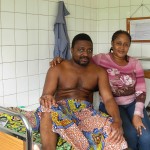
Yeyette and Joel Boko
I travelled from Libreville, 300 kms away, in a taxi-brousse. The first to get in was with Yeyette Boko. She was worried to tears about her husband, Joel Boko, who was in Lambaréné being treated for an ulcerous thigh. He needed a graft. So Yvette had wrestled a two-week leave from her employer to be with him.
She breezed into his room: “Mon chéri, I missed you so much!” They snuggled on the bed and called their four-year-old son, who was staying with an aunt in the capital.
Next day I visited again. Yeyette had cooked a hearty meal. He seemed stronger. They looked happy.
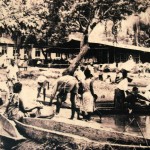
The old landing by the hospital-village.
Read about worldwide efforts to measure and pay women’s unpaid care work
]]>